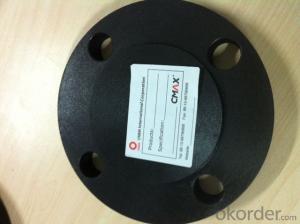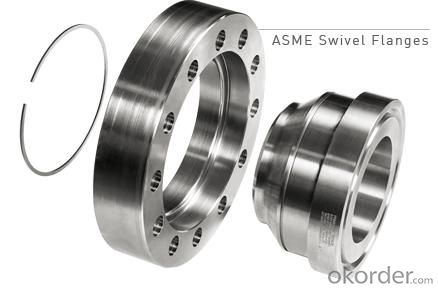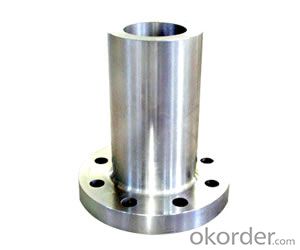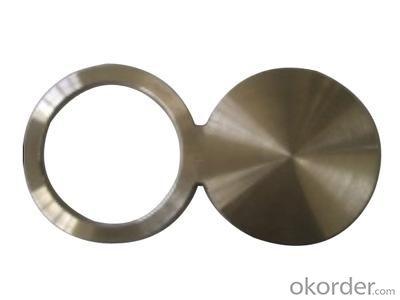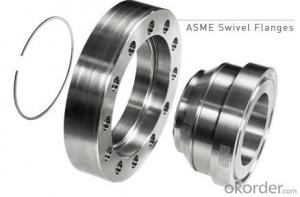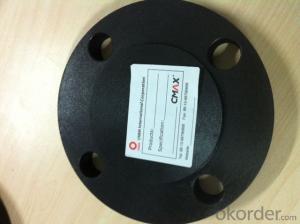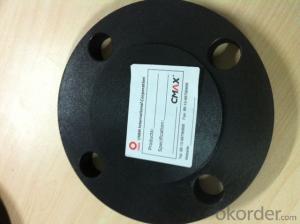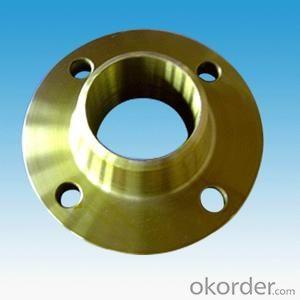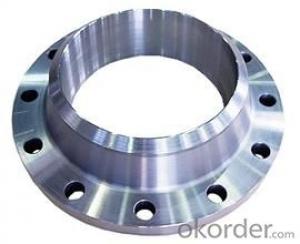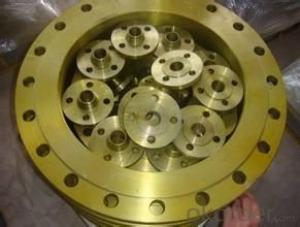CARBON STEEL FORGED FLANGE A105 ASME B16.5
- Loading Port:
- Tianjin
- Payment Terms:
- TT OR LC
- Min Order Qty:
- 1 pc
- Supply Capability:
- 10000 pc/month
OKorder Service Pledge
OKorder Financial Service
You Might Also Like
Package Of Carbon Steel Flange:
PACKED IN PLYWOOD CASES OR PALLETS
Painting Of Carbon Steel Flange:
BLACK OR YELLOW PAINTING FOR CARBON STEEL
Marking Of Carbon Steel Flange:
REFER TO MARKING DOCUMENT or AS PER CUSTOMER REQUEST
Shipping Marks Of Carbon Steel Flange:
EACH WOODEN BOX TWO PLASTIC SHIPPING MARKS
Specification Of Carbon Steel Flange:
Carbon Steel Flange Slip On Flange, Plate Flange, Blind Flange, Welding Neck Flange, Socket Welded Flange, Thread Flange, Lap Joint Flange, Long Welding Neck Flange
Size : 1/2"-48"
Wall Thickness.: SCH10-SCH160, SGP , XS, XXS, DIN ,STD
| Name | Carbon Steel Flange |
| Size | 1/2" - 48" |
| Face | RF, FF, RTJ |
| Wall thickness | Sch5-Sch160 XXS,STD,XS, SGP |
| Standard | ASME B16.5, B16.47, BS4504, JIS B2220, API 6A, 11Detc. |
| We can also produce according to drawing and standards provided by customers. | |
| Material | ASTM A105, A350 LF1, LF2, F11, F12, St35.8, St45.8, 15Mo3etc, |
| Packaging | Wooden Cases, wooden pallet , or carton box , or nylog bag and then in wooden cases |
| Surface Treatment | Paintting black or yellow color, or Anti-rust Oil |
| Delivery Time | 20-30 days, after received advance payment. |
| Quality | 100% Heat Treatment, No Welding repair |
| Others | 1.Special design available according to your drawing. |
| 2.anti-corrosion and high-temperature resistant with black painting | |
| 3. All the production process are made under the ISO9001:2000 strictly. | |
| 4. A conformity rate of ex-factory inspection of products. | |
| 5. we have export right , offering FOB , CNF CIF price |
STANDARD & MATERIAL GRADE
STAMDARD Of Carbon Steel Flange
| Standard | Pressure | Size | |
| European Standard | EN 1092-1 | Class PN6 ~ PN100 | DN10 ~ DN4000 |
| American Standard | ASME B16.5 | Class 150 ~ 2500 | 1/2" ~ 24" |
| ASME B16.47A | Class 150 ~ 900 | 26" ~ 60" | |
| ASME B16.47B | Class 75 ~ 900 | 26" ~ 60" | |
| German Standard | DIN 2527,2566,2573, 2576, 2627-2638,2641,2642,2655,2656 | PN6~PN100 | DN10 ~ DN4000 |
| Australian Standard | AS2129 | Table: T/A, T/D, T/E, T/F, T/H, T/J, T/K, T/R, T/S, T/T | DN15 ~ DN3000 |
| AS4087 | PN16 ~ PN35 | DN50 ~ DN1200 | |
| British Standard | BS4504 | PN2.5 ~ PN40 | DN10 ~ DN4000 |
| BS10 | T/A, T/D, T/E, T/F, T/H | 1/2" ~ 48" | |
| Japanese Standard | JIS B2220 | 5K ~ 30K | DN10 ~ DN1500 |
| API Standard | API 6A, 11D | 2000 PSI ~ 20000 PSI | 1 13/16" ~ 30" |
| French Standard | NFE 29203 | PN2.5 ~ PN420 | DN10 ~ DN600 |
MATERIAL Of Carbon Steel Flange
| Carbon Steel | ||
| Material Standard | Material Grade | |
| ASTM | ASTM A105 | A105, A105N |
| ASTM A350 | A350 LF1, LF2 | |
| ASTM A182 | F11, F12, F22 | |
| ASTM A106 | A, B, C | |
| DIN EN | DIN17175 | St35.8, St45.8, 15Mo3 |
| EN10216-2 | 195GH,P235GH, P265GH, 20MnNb6 | |
| JIS | JIS G3461 | STB340,410,510 |
| JIS G3462 | STBA12, 13, 20, 22, 23, 24 | |
| JIS G3454,G3455,G3456 | STPG 370, STB410, STS370,410, 510 | |
| STPT 370, 410, 480 | ||
- Q: How are steel pipes used in the fabrication of storage tanks?
- Due to their strength, durability, and versatility, steel pipes are widely employed in the construction of storage tanks. Throughout the tank fabrication process, these pipes serve various functions. To begin with, steel pipes are utilized in establishing the tank's foundation. By providing a robust base, they ensure stability and prevent potential structural problems. Moreover, steel pipes are employed in constructing the tank's shell. Through welding, these pipes are joined together to form a cylindrical structure capable of withstanding the pressure and weight of the stored material. Furthermore, steel pipes are crucial for installing inlet and outlet pipes. These pipes enable the controlled flow of materials in and out of the storage tank. Additionally, steel pipes frequently play a role in fabricating support structures within the tank. These structures distribute the weight of the stored material and offer additional reinforcement to the tank. When it comes to maintenance and repair, steel pipes are also essential. They are used to install access points such as manholes or inspection ports, facilitating routine inspections, cleaning, and any necessary repairs. In summary, steel pipes are indispensable in the fabrication of storage tanks, providing a resilient and dependable framework. They are employed in constructing the tank's foundation, shell, inlet and outlet pipes, support structures, and access points. With their durability and versatility, steel pipes ensure the integrity and functionality of storage tanks.
- Q: How are steel pipes connected together?
- Steel pipes are typically connected together through various methods such as welding, threading, and flanging. Welding involves fusing the ends of pipes together using high heat, creating a strong and permanent connection. Threading involves screwing the ends of pipes together using threads, while flanging involves connecting pipes by flaring or bending their ends and securing them with bolts. These methods ensure a secure and reliable connection between steel pipes.
- Q: How are steel pipes used in the manufacturing of chemical processing plants?
- Steel pipes are commonly used in chemical processing plants for various purposes, such as transporting fluids and gases, as well as providing structural support. They are highly resistant to corrosion, making them ideal for handling corrosive materials in the plant. Additionally, steel pipes can withstand high temperatures and pressure, ensuring the safe and efficient operation of chemical processes.
- Q: How are steel pipes used in the manufacturing of food processing machinery and equipment?
- Steel pipes are commonly used in the manufacturing of food processing machinery and equipment due to their durability, corrosion resistance, and high strength. These pipes are used for various purposes such as fluid transportation, steam generation, and structural support in the machinery. They are also crucial for conveying liquids, gases, and other food ingredients safely and hygienically throughout the manufacturing process. Additionally, steel pipes can withstand high temperatures and pressures, making them ideal for applications like sterilization, pasteurization, and cooking in food processing machinery.
- Q: What is the role of steel pipes in power plants?
- Steel pipes play a crucial role in power plants as they are used for transporting various fluids, such as water, steam, and fuel, throughout the facility. They provide a durable and reliable means of conveying these substances under high pressure and temperature conditions, ensuring efficient energy generation and distribution. Additionally, steel pipes are essential for the cooling systems in power plants, allowing for the safe transfer of heat from the facility to the environment.
- Q: What are the advantages of using steel pipes in industrial plants?
- Using steel pipes in industrial plants offers numerous advantages. Firstly, their exceptional strength and durability make them ideal for transporting materials and fluids under high temperatures, pressures, and heavy loads. Secondly, steel pipes have excellent resistance to corrosion, which is crucial in industrial settings where they encounter corrosive substances or harsh environmental conditions. This resistance ensures their longevity, prevents leaks, and eliminates potential hazards. Additionally, steel pipes are highly versatile. They can be easily fabricated and customized to meet specific requirements, including different sizes and shapes. This flexibility simplifies installation and maintenance, reducing downtime and improving overall efficiency. Moreover, steel pipes have a smooth interior surface, allowing for efficient material flow with minimal resistance and pressure drop. Their smoothness also prevents the accumulation of deposits and contaminants, ensuring a clean and hygienic environment. Furthermore, steel pipes exhibit high resistance to fire, providing an added layer of safety in industrial plants where fires can have disastrous consequences. Lastly, while the initial installation cost of steel pipes may be higher compared to other materials like plastic or copper, their durability and low maintenance requirements result in significant long-term cost savings. With a long lifespan and resistance to corrosion and damage, the need for frequent replacements or repairs is minimized. In conclusion, the use of steel pipes in industrial plants offers various advantages, including strength, durability, corrosion resistance, versatility, efficient flow, fire resistance, and cost-effectiveness. These qualities make steel pipes a reliable and efficient choice for diverse applications within industrial facilities.
- Q: What are the uses of welded steel pipes?
- Ordinary carbon steel wire bushings (GB3640-88) are industrial and civil construction, installation of machinery, equipment and other electrical installation works for the protection of electric wire.
- Q: How are steel pipes used in the construction of water supply systems?
- Steel pipes are commonly used in the construction of water supply systems due to their durability, strength, and resistance to corrosion. They are used for transporting water from sources such as reservoirs and wells to treatment plants, and then distributing it to homes, buildings, and other structures. Steel pipes are also used for transporting wastewater and sewage. Their ability to withstand high pressure and extreme weather conditions makes them ideal for ensuring a reliable and long-lasting water supply infrastructure.
- Q: Can steel pipes be used for conveying slurry and slurries?
- Steel pipes are versatile and can be used to transport slurry and slurries. They are frequently employed in a range of applications, including the conveyance of fluids, gases, and solids. These pipes are renowned for their durability, strength, and resistance to corrosion, which makes them well-suited for handling abrasive materials like slurry and slurries. To enhance their protective capabilities against wear and tear caused by the abrasive nature of slurries, steel pipes are commonly lined with materials such as rubber or ceramic. The choice of steel grade and lining material depends on the specific requirements of the slurry being transported, including factors like particle size, concentration, and temperature. In summary, steel pipes are a dependable and efficient choice for the transportation of slurries across various industries, including mining, wastewater treatment, and chemical processing.
- Q: What is the weight of hot galvanized steel tubes? DN150 4mm wall thickness
- DN150 4mm wall thickness welded steel pipe theoretical weight is 16.21kg/m, galvanized steel pipe should be multiplied by the weight coefficient after galvanizing, C, DN150, wall thickness of 4mm, C=1.032, DN150, theoretical weight and wall thickness of 4mm galvanized steel is 1.02*16.21=16.7287kg/m = 16.73kg/m.
Send your message to us
CARBON STEEL FORGED FLANGE A105 ASME B16.5
- Loading Port:
- Tianjin
- Payment Terms:
- TT OR LC
- Min Order Qty:
- 1 pc
- Supply Capability:
- 10000 pc/month
OKorder Service Pledge
OKorder Financial Service
Similar products
Hot products
Hot Searches
Related keywords
